Saffron Extract and Its Surprising Benefits for Mood Disorders
Introduction
Saffron — the luxurious golden spice once worth more than its weight in gold — has long been treasured for its flavor, color, and healing properties. But beyond its culinary charm, modern science is uncovering something remarkable: saffron may be one of nature’s most effective mood enhancers.
In recent years, researchers have discovered that saffron extract (from Crocus sativus L.) can help relieve symptoms of depression, anxiety, and emotional imbalance — with results comparable to some prescription antidepressants, yet without the side effects.
Let’s explore the fascinating science behind saffron’s mood-lifting properties, how it works in the brain, what studies say, and how you can use it safely to support emotional health.
Looking for supplements for Brain Fog? Click here.
🌼 The Ancient Roots of Saffron
Saffron comes from the stigma of the Crocus sativus flower, a delicate purple bloom cultivated mainly in Iran, Spain, Greece, and India. Each flower produces only three tiny stigmas — meaning it takes about 75,000 flowers to make just one pound of saffron 🌸.
Historically, saffron has been used in ancient Persia, Egypt, and Greece for its calming and aphrodisiac effects, as well as for digestive and menstrual complaints.
What’s remarkable is that traditional healers described saffron as a “mood brightener” centuries before scientists understood neurotransmitters. Today, we know why.
🧠 The Science Behind Saffron’s Mood Effects

Modern studies reveal that saffron’s mood-enhancing power lies in its bioactive compounds, primarily:
Crocin (antioxidant carotenoid)
Crocetin (neuroprotective)
Safranal (mood-regulating volatile oil)
Picrocrocin (responsible for flavor, also has mild neurological effects)
These compounds influence several biochemical systems linked to mood, motivation, and emotional stability.
⚙️ Saffron and Serotonin
Saffron’s primary mechanism appears to be its ability to enhance serotonin activity — the neurotransmitter responsible for happiness, calm, and emotional balance.
Saffron extract inhibits serotonin reuptake, meaning it allows serotonin to remain active in the brain longer — similar to how selective serotonin reuptake inhibitors (SSRIs) work, but much more gently.
💬 More serotonin = better mood, smoother emotions, and less anxiety.
🌿 Dopamine and Norepinephrine Balance
In addition to serotonin, saffron’s compounds modulate dopamine (motivation, reward) and norepinephrine (alertness, resilience to stress).
By balancing these neurotransmitters, saffron supports mental clarity, optimism, and the ability to handle daily stress without emotional crashes.
🧩 Anti-Inflammatory and Antioxidant Actions
Chronic inflammation and oxidative stress can disrupt brain signaling and lower mood — a phenomenon now known as neuroinflammation.
Saffron’s carotenoids (especially crocin) neutralize free radicals, reduce neuroinflammation, and protect neurons against stress-related damage.
✨ A calmer, less inflamed brain is a happier, more stable brain.
💛 What Research Says: Clinical Evidence for Saffron and Mood
In the last two decades, more than 30 human studies have explored saffron’s impact on mood, anxiety, and overall emotional health.
The findings are consistent and impressive.
🧠 Saffron vs. Placebo in Depression
In multiple randomized controlled trials (RCTs), saffron extract showed significant improvement in depressive symptoms compared to placebo — often within just 4 to 6 weeks.
📖 Example:
A 2014 Journal of Integrative Medicine study found that 30 mg/day of saffron improved mood and reduced anxiety in adults with mild-to-moderate depression — with no significant side effects.
Participants reported:
Greater motivation
Less fatigue
Fewer negative thoughts
🌿 In other words, saffron helped them feel like themselves again.
⚖️ Saffron vs. Antidepressants
Even more fascinating: saffron has been shown to work as effectively as certain antidepressants, such as fluoxetine (Prozac) and imipramine.
🔬 Key Studies:
A 2005 Journal of Ethnopharmacology trial compared 30 mg saffron daily with 20 mg fluoxetine in patients with mild-to-moderate depression.
📊 Result: Both groups improved equally — but the saffron group experienced fewer side effects.
A 2013 Phytotherapy Research study confirmed similar findings: saffron matched fluoxetine’s efficacy in reducing depressive symptoms.
💬 Imagine an herbal extract performing on par with pharmaceuticals — gently and naturally.
🌞 Saffron and Anxiety
Saffron also reduces anxiety, often overlapping with its antidepressant effects.
A 2016 Human Psychopharmacology study found that 50 mg of saffron daily reduced both anxiety and tension in adults within just two weeks.
This effect may stem from its serotonin regulation and cortisol-lowering properties, which help the body recover from chronic stress.
🌜 Saffron for Sleep and Fatigue
Low serotonin and dopamine levels can lead to poor sleep and mental exhaustion. By boosting these neurotransmitters, saffron improves sleep quality, energy, and resilience.
A 2020 Journal of Clinical Sleep Medicine trial showed that saffron supplementation improved sleep duration and quality in people with mild insomnia — without grogginess or dependency.
💡 Saffron and PMS or Menopausal Mood Swings
Hormonal fluctuations in PMS or menopause often lower serotonin, leading to irritability, sadness, and fatigue.
Several studies show saffron’s mood-stabilizing power in women’s hormonal mood disorders:
A 2008 study in BJOG found that 30 mg saffron daily reduced PMS-related mood swings, tension, and cravings.
Another trial found saffron improved menopausal mood and reduced hot flashes through serotonin and antioxidant effects.
💬 A golden spice for the golden years.
🌿 How Saffron Affects the Brain
Saffron’s impact on mood is multidimensional — it works across neurotransmitter, hormonal, and inflammatory systems.
| Mechanism | Effect |
|---|---|
| Serotonin reuptake inhibition | Sustains serotonin levels for better mood |
| Dopamine modulation | Improves motivation and pleasure |
| Antioxidant activity | Protects neurons from oxidative damage |
| Cortisol regulation | Lowers stress hormones |
| Neurogenesis support | Encourages new neuron growth in hippocampus |
🧠 This combination creates a state of emotional equilibrium and cognitive clarity — calm yet alert, uplifted yet grounded.
Looking for supplements for Brain Fog? Click here.
🌸 Other Cognitive and Emotional Benefits
⚡ Improved Focus and Memory
Saffron’s compounds support healthy acetylcholine levels and reduce oxidative damage, improving attention and memory — especially in older adults.
A 2019 Nutrients study found that saffron extract enhanced cognitive performance and visual memory in adults with mild cognitive impairment.
🌈 Increased Motivation and Pleasure
Low dopamine often manifests as apathy and loss of joy. By gently raising dopamine, saffron restores natural motivation and zest for life without overstimulation.
💬 Many users describe a “quiet happiness” — not a high, but a subtle, steady uplift.
😌 Reduction of Emotional Reactivity
Chronic stress can sensitize the amygdala, the brain’s emotional alarm system. Saffron helps retrain this response, improving resilience to stress and lowering emotional volatility.
✨ Think of it as emotional armor that helps you stay calm through the storm.
💊 Dosage and How to Use Saffron
🧠 Clinical Dosages
Most studies use 30 mg/day of standardized saffron extract, usually divided into two doses (15 mg morning + 15 mg evening).
✅ Common Forms
Capsules or softgels: easiest and most reliable.
Liquid extract or tincture: faster absorption.
Tea: pleasant but typically too weak for therapeutic doses.
🧴 Look for extracts standardized to contain at least 0.3% safranal and 2% crocin.
🍽️ Best Time to Take It
For mood and focus: morning or midday.
For sleep and relaxation: evening dose can help with rest.
💬 Consistency is key — effects build gradually over 2–4 weeks.
⚠️ Safety and Side Effects
Saffron is very safe when taken within the studied range (up to 100 mg/day).
Possible mild effects:
Digestive upset
Drowsiness (rare)
Allergic reaction (extremely rare)
Avoid exceeding 200 mg/day, as high doses may cause dizziness or nausea.
⚠️ Pregnant women should avoid high doses — saffron may mildly stimulate uterine contractions.
🌿 Combining Saffron with Other Mood-Supporting Nutrients
Saffron pairs beautifully with other natural compounds that support neurotransmitter balance and stress resilience.
| Supplement | Synergy | Benefit |
|---|---|---|
| Omega-3s (EPA/DHA) | Anti-inflammatory | Improves brain cell communication |
| Magnesium Glycinate | Supports GABA and calm | Eases stress and anxiety |
| Vitamin B6 & B12 | Neurotransmitter synthesis | Boosts serotonin and dopamine |
| L-Theanine | Enhances alpha waves | Promotes calm focus |
| 5-HTP | Serotonin precursor | Works synergistically with saffron |
💊 Stack idea:
Morning → Saffron + Omega-3
Evening → Saffron + Magnesium Glycinate
🌬️ Breathwork and Lifestyle Synergy

Saffron’s mood benefits amplify when paired with relaxation and mindfulness practices that calm the nervous system.
🌫️ Try This 4-6 Breath:
Inhale through your nose for 4 seconds.
Exhale slowly for 6 seconds.
Repeat for 5 minutes.
This stimulates the vagus nerve, enhancing serotonin activity and deep calm — complementing saffron’s natural effects.
🌿 The spice works through chemistry, breathwork through energy — together, they balance body and mind.
Want to try Breathwork? Click Here.
🌈 Real-Life Story
Case Example:
Maria, a 45-year-old teacher, experienced mild depression and PMS-related mood swings. She started taking 30 mg saffron extract daily.
After 3 weeks, she noticed:
Brighter mood ☀️
Better sleep 🌙
Less irritability and fatigue 🌿
💬 “It didn’t numb me — it lifted the heaviness. I feel calm, but alive again.”
🌸 Comparing Saffron to Antidepressants
| Feature | Saffron | SSRIs (e.g., fluoxetine) |
|---|---|---|
| Mechanism | Serotonin reuptake inhibition (natural) | Serotonin reuptake inhibition (synthetic) |
| Onset | 2–4 weeks | 2–6 weeks |
| Side effects | Minimal | Common (fatigue, libido loss) |
| Dependency | None | Possible |
| Accessibility | Over-the-counter supplement | Prescription required |
💬 Saffron’s effects are gentler but steadier — ideal for mild-to-moderate mood issues or as an adjunct to lifestyle therapies.
🌞 Saffron and Seasonal Affective Disorder (SAD)
Saffron may also help counteract winter blues by boosting serotonin and dopamine, supporting energy and motivation during darker months.
Combine saffron with light therapy or vitamin D3 for best results in seasonal depression.
🧘 Mind-Body Connection and Saffron’s “Glow Effect”
Saffron is unique among mood herbs because it also enhances mind-body harmony — people often describe both emotional and physical vitality returning.
Possible additional benefits:
Improved libido and intimacy
Sharper mental focus
Reduced fatigue and burnout
Brighter skin tone (due to antioxidant carotenoids)
✨ When your inner light brightens, it shows on the outside too.
Looking for online therapy ? Click Here.
⚖️ Key Takeaways
✅ Saffron extract is a natural, research-backed mood enhancer.
✅ Works by boosting serotonin, dopamine, and antioxidant protection.
✅ Effective for mild-to-moderate depression and anxiety.
✅ Improves sleep, energy, and PMS or menopausal mood swings.
✅ Safe, gentle, and suitable for long-term use.
🌿 Saffron isn’t just a spice — it’s emotional sunshine in a capsule.
📚 References
Akhondzadeh, S., et al. (2005). “Comparison of Crocus sativus L. and fluoxetine in the treatment of mild-to-moderate depression.” Journal of Ethnopharmacology, 97(2), 281–284.
Lopresti, A. L., et al. (2017). “Saffron (Crocus sativus) for depression: A systematic review.” Human Psychopharmacology, 32(4), e2590.
Moshiri, E., et al. (2006). “Crocus sativus L. in the treatment of mild-to-moderate depression: A double-blind, randomized, and placebo-controlled trial.” Phytotherapy Research, 20(2), 103–106.
Basti, A. A., et al. (2008). “Saffron for premenstrual syndrome: A double-blind, randomized, and placebo-controlled trial.” BJOG, 115(4), 515–520.
Kelishadi, R., et al. (2020). “Effects of saffron supplementation on sleep quality: A randomized trial.” Journal of Clinical Sleep Medicine, 16(9), 1521–1529.
Schmid, D., et al. (2019). “Saffron and cognition: A systematic review and meta-analysis.” Nutrients, 11(9), 2281.
Lopresti, A. L., et al. (2018). “Saffron for mental health: Mechanisms of action, clinical applications, and future directions.” Frontiers in Pharmacology, 9, 1173.
Related Posts
-

Nootropics That Promote Calm and Rest
Explore the world of calming nootropics — natural brain enhancers that promote relaxation, better focus, and deeper rest. Learn how L-Theanine, magnesium, ashwagandha, and other adaptogens help balance your nervous system, reduce stress, and support restorative sleep.
-

Best Natural Supplement Stack for Sleep
Discover the best natural supplement stack for deep, restorative sleep. Learn how nutrients like magnesium, L-theanine, glycine, and calming herbs such as chamomile and ashwagandha work together to relax your body, calm your mind, and improve sleep quality—naturally and safely.
-

Combining L-Theanine and Magnesium for Sleep: A Calm Night, Naturally
Discover how combining L-Theanine and Magnesium can help you drift into deep, restorative sleep. Learn how this natural duo calms the mind, relaxes the body, and supports your nervous system—without grogginess the next morning.
-

How to Sleep Better After Intense Workouts
Struggling to fall asleep after a tough workout? Learn how to optimize your post-training recovery with nutrition, hydration, and science-backed sleep strategies. Discover how to calm your nervous system, balance hormones, and wake up fully recharged for your next session.
-

Ashwagandha and Valerian: A Bedtime Combo for Deep Rest and Emotional Reset
Discover the calming synergy of Ashwagandha and Valerian root, two natural sleep aids that help quiet the mind, ease anxiety, and promote deeper rest. Learn how this herbal duo supports the nervous system, balances stress hormones, and restores emotional peace — without next-day grogginess.
-

How to Create a Resilience-Boosting Diet
Discover how to build emotional and physical strength from the inside out with a resilience-boosting diet 🍎. Learn which foods stabilize your mood, how supplements like magnesium and omega-3s strengthen your stress response, and why pairing nutrition with breathwork and therapy creates lasting calm, focus, and vitality 🌿💪.
-

Best Teas and Herbal Blends for Calmness: Nature’s Way to Restore Inner Peace
Ashwagandha, the ancient adaptogenic herb, helps your body find balance during stress. Known as “Indian ginseng,” it supports cortisol regulation, boosts energy, and restores calm clarity. Discover how this powerful root promotes resilience, emotional balance, and steady vitality — one cup at a time. 🌸
-

Parenting and Emotional Strength: How to Raise Children Without Losing Yourself
Empathy is the bridge that connects hearts — the quiet power to understand, feel, and support another’s emotions without judgment. Learn how empathy strengthens relationships, enhances communication, and cultivates deeper compassion in everyday life. 🌿
-

How to Bounce Back from Public Failure: Reclaiming Confidence, Purpose, and Power
Visualization is more than imagination — it’s brain training for resilience. By picturing calm, success, or healing, you activate the same neural pathways as real experience. Learn how daily visualization rewires your brain for confidence, emotional balance, and recovery from stress. ✨
-

Coping with Financial Stress Through Resilience: How to Stay Grounded When Money Feels Tight
Body awareness is the foundation of emotional resilience. By tuning into your body’s signals — tension, fatigue, or calm — you learn to recognize stress before it overwhelms you. Discover how mindfulness, gentle movement, and breathwork can deepen your connection with your body and restore balance from the inside out. 🧘
-

How to Stay Positive During Chronic Illness: A Guide to Emotional Strength and Hope
Creativity is more than art — it’s a form of healing. Whether through painting, writing, music, or small acts of expression, creativity helps release emotion, calm the nervous system, and reconnect you to joy. Discover how to use creativity as a tool for emotional balance, resilience, and self-discovery. 🌿
-

Resilience Tips for Caregivers: How to Stay Strong While Caring for Others
Joy isn’t the absence of pain — it’s the quiet strength to find light even in challenging times. Cultivating joy through small daily moments restores balance, releases stress, and reminds you of life’s beauty. Learn how to reconnect with authentic happiness, rebuild emotional energy, and nurture your nervous system through gratitude, presence, and play. 🌿
-

Building Resilience After a Breakup: How to Heal, Rebuild, and Rise Stronger
Social connection is one of the strongest predictors of emotional resilience. During difficult times, genuine relationships act as anchors — calming the nervous system, reducing stress hormones, and helping you regain perspective. Learn how cultivating real human connection can strengthen your mind, heart, and overall well-being. 🌿
-

How to Stay Emotionally Strong During Job Loss
Your emotions are powered by brain chemistry — a delicate balance of neurotransmitters like serotonin, dopamine, and cortisol. When these chemicals work in harmony, you feel calm, focused, and resilient. Learn how daily habits, nutrition, and mindfulness can support your brain chemistry and boost emotional well-being naturally. 🌿
-

The Role of Hormones in Emotional Stability: How Your Chemistry Shapes Your Calm
Hormones shape more than your body — they shape your emotions, resilience, and sense of calm. From cortisol to serotonin, these chemical messengers influence how you react to stress, connect with others, and recover from challenges. Learn how to balance your hormones naturally to build lasting emotional stability and harmony within. 💫
-

Mitochondria and Emotional Energy: The Cellular Power Behind Your Mood
Breathwork is one of the most powerful tools for emotional regulation and cellular balance. Through intentional breathing, you can calm your nervous system, increase oxygen flow to the brain, and even support mitochondrial energy. Learn how conscious breathing connects body and mind — transforming stress into presence and emotional strength. 🌿
-

Inflammation and Its Impact on Mood Resilience: The Silent Link Between Body and Mind
Inflammation doesn’t just affect the body — it impacts the mind. Chronic inflammation alters brain chemistry, depletes serotonin, and makes emotional recovery harder. Learn how calming inflammation through nutrition, mindfulness, and sleep can restore balance, resilience, and a renewed sense of emotional strength. 💫
-

How Antioxidants Protect Emotional Well-being: The Hidden Link Between Oxidative Stress and Mental Health
Antioxidants do more than protect your body — they defend your mind. By neutralizing oxidative stress, antioxidants support serotonin, dopamine, and brain energy pathways that keep you calm, focused, and emotionally balanced. Discover how foods like berries, green tea, and dark chocolate nourish your brain, boost mood, and strengthen resilience from the inside out. 🌿✨
-

The HPA Axis and Emotional Health: The Hidden Bridge Between Stress and Mind
Neuroplasticity — the brain’s ability to rewire and adapt — is the foundation of emotional healing and resilience. When you face stress, trauma, or change, your neural pathways can reshape themselves to support new patterns of calm, focus, and self-awareness. Learn how daily practices like mindfulness, therapy, and breathwork strengthen neuroplasticity to transform emotional pain into personal growth. 🌸
-

Why Cortisol Control Is Key to Resilience: Mastering Stress to Build Emotional Strength
Controlling cortisol — the body’s main stress hormone — is the secret to lasting resilience. When cortisol levels stay balanced, your mind becomes clearer, emotions steadier, and energy more sustainable. Learn how breathwork, mindset shifts, adaptogens, and daily rhythms can help you calm your stress response and build true inner strength. 🌞💪
-

Dopamine’s Influence on Motivation and Recovery: Reigniting Drive and Balance
Healthy relationships are the foundation of emotional balance and resilience. Whether romantic, familial, or platonic, genuine connection releases dopamine, serotonin, and oxytocin — the brain’s “bonding trio” — helping us feel secure, motivated, and seen. Learn how trust, empathy, and communication not only strengthen your connections but also reshape your nervous system for deeper emotional well-being. 🌿🤝
-

The Role of Serotonin in Resilience: How This “Mood Molecule” Shapes Emotional Strength
Serotonin — often called the “resilience molecule” — plays a vital role in how we handle stress, regulate mood, and recover from emotional challenges. Beyond happiness, this powerful neurotransmitter helps balance the gut-brain axis, stabilize the nervous system, and support emotional flexibility. Learn how nutrition, sunlight, mindfulness, and adaptogens can naturally boost serotonin and strengthen your emotional resilience. 🌞🧠
-

How Neuroplasticity Supports Emotional Growth: Rewiring the Brain for Resilience
Neuroplasticity is the brain’s built-in power to grow, adapt, and heal — and it’s the foundation of emotional transformation. Every mindful breath, compassionate act, or reframed thought strengthens new neural pathways that support resilience and self-awareness. Learn how your brain rewires through daily habits, helping you turn emotional challenges into opportunities for growth and calm. 🌿
-

Tai Chi and Adaptogens for Mind-Body Balance: The Art of Harmonizing Energy and Resilience
Alchemy isn’t just an ancient science — it’s a timeless symbol of transformation and inner balance. By blending the physical and spiritual, alchemy teaches us that change begins from within. Just as metals are refined into gold, we too can transmute emotional pain, stress, and chaos into clarity and strength through mindful practice and self-awareness. 🌙✨
-

Cold Therapy and Emotional Control: Training the Mind Through the Body
Cold therapy isn’t just for athletes — it’s a tool for emotional mastery. By exposing your body to controlled cold, you train your nervous system to stay calm under stress, improving focus, mood, and resilience. This article explores the science of cold exposure, its impact on hormones and the vagus nerve, and how ice baths and cold showers can help you build emotional control, one breath at a time. 🧊🧘♂️
-

How Music Influences Emotional Recovery: The Healing Soundtrack of the Mind
Neuroplasticity — the brain’s ability to rewire and heal itself — is at the heart of emotional recovery. Through mindful habits, music, therapy, and consistent mental stimulation, your brain can form new connections that support resilience and well-being. Discover how neuroplasticity turns pain into growth, helping you rebuild balance, focus, and emotional strength. 🌿
-

Nature Therapy for Building Resilience: Reconnecting With the Healing Power of the Earth
Nature therapy helps rebuild emotional resilience by reconnecting you with the healing rhythms of the Earth. From forest walks to sunlight exposure, nature restores balance to your nervous system, lowers stress hormones, and teaches emotional adaptability. Learn how spending time outdoors can enhance mental clarity, calm anxiety, and awaken your natural capacity to heal. 🌞
-

Breathwork Techniques That Pair with Supplements: The Ultimate Synergy for Stress Relief and Mental Clarity
Breathwork and supplements create a powerful mind-body synergy for stress relief, focus, and energy. By combining intentional breathing with adaptogens, nootropics, and calming nutrients, you can naturally regulate cortisol, sharpen mental clarity, and boost emotional balance. This guide explores the best breathwork techniques and supplement pairings to help you feel centered, calm, and energized from the inside out. 🌿
-

Why Cortisol Balance Matters for Emotional Strength
Balancing cortisol — your body’s main stress hormone — is essential for emotional resilience. When cortisol is chronically high, your mind stays stuck in survival mode, leading to fatigue, anxiety, and emotional instability. This article explores how nutrition, supplements, breathwork, and therapy can help restore healthy cortisol rhythms, regulate the nervous system, and strengthen your ability to handle life’s challenges with calm focus and emotional strength. 🌿
-

Best Supplements for Students During Exam Season: Focus, Energy, and Memory Support
Studying late into the night? Learn which natural supplements can boost focus, memory, and mental stamina during exam season — without the crash. From omega-3s to Bacopa and Rhodiola, discover your brain’s ultimate exam support stack. 🎓🧠
-

Natural Memory Boosters for Seniors: How to Keep Your Mind Sharp and Focused
Stay mentally sharp and confident as you age. Discover science-backed natural supplements and lifestyle habits that boost memory, focus, and brain longevity for seniors. 🌿🧠
-

The Link Between Stress, Cortisol, and Memory Loss
Chronic stress can quietly erode your memory — and cortisol is the key culprit. Learn how stress hormones affect the brain, why the hippocampus shrinks under pressure, and how natural strategies can help you restore memory and mental clarity. 🧠✨
-

How to Build a Daily Supplement Routine for Memory Health
Want to sharpen your memory and stay mentally clear? Learn how to build a daily supplement routine for memory health — from morning focus to nighttime brain repair. Discover science-backed nutrients that boost recall, focus, and long-term cognitive resilience. 🧠🌿
-

Top 5 Natural Supplements for Memory Recall and Focus
Looking to boost memory and concentration naturally? Discover the top 5 supplements — Bacopa, Ginkgo Biloba, Lion’s Mane, Rhodiola, and Phosphatidylserine — that enhance focus, recall, and long-term brain health. 🧠✨
-

Top Supplements to Balance Mood Naturally
From omega-3s to adaptogens, discover the top natural supplements proven to support emotional balance, reduce stress, and promote inner calm — safely and effectively. 🌿✨
-
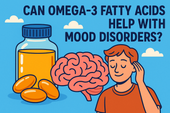
Can Omega-3 Fatty Acids Help with Mood Disorders?
Omega-3 fatty acids do more than support heart health — they can help balance mood, reduce depression, and calm anxiety. Discover how EPA and DHA nourish your brain, fight inflammation, and support emotional well-being from within. 🌊🧠
-

Vitamin D and Mood: The Sunshine Vitamin for Emotional Balance
Could the key to emotional balance be as simple as a little sunlight? Discover how vitamin D — the sunshine vitamin — influences serotonin, reduces inflammation, and helps you feel more positive and resilient year-round. ☀️💛
-

The Role of Magnesium in Reducing Irritability and Low Mood
Feeling on edge or emotionally drained? Magnesium could be the missing link between your body and your mood. Discover how this essential mineral reduces irritability, balances neurotransmitters, and helps your nervous system find calm again. 🌿✨
-
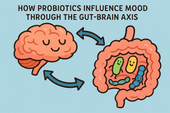
How Probiotics Influence Mood Through the Gut-Brain Axis
Discover how probiotics can do more than support your digestion—they can actually uplift your mood. This article explores the fascinating gut-brain axis and how balancing your gut bacteria through probiotics may help reduce anxiety, improve emotional stability, and support long-term mental well-being. 🌿🧠
-
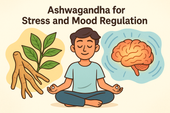
Ashwagandha for Stress and Mood Regulation
Discover how Ashwagandha, the powerful adaptogenic herb 🌿, helps your body manage stress and regulate mood. Learn how it balances cortisol, boosts GABA and serotonin, and supports emotional stability — helping you feel calm, focused, and resilient every day.
-
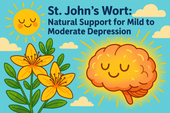
St. John’s Wort: Natural Support for Mild to Moderate Depression
Discover how St. John’s Wort, the “sunshine herb” 🌼, naturally supports mild to moderate depression. Learn how it boosts serotonin, balances mood, and promotes emotional resilience — with research showing its effectiveness compares to antidepressants, but with fewer side effects.
-
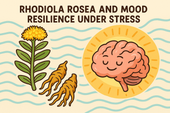
Rhodiola Rosea and Mood Resilience Under Stress
Discover how Rhodiola rosea helps your body adapt to stress 🌿. Learn how this powerful adaptogen balances cortisol, supports serotonin and dopamine, and strengthens emotional resilience — helping you stay calm, focused, and energized under pressure.
-

Chamomile and Lavender: Herbal Calm for Emotional Fluctuations
Discover how chamomile and lavender bring calm to emotional ups and downs 🌿. Learn how these two soothing herbs balance your nervous system, ease anxiety, and support restful sleep — naturally helping you find peace and emotional stability.
-
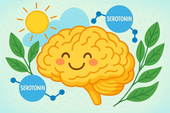
5-HTP and Serotonin: A Natural Path to Lifting Mood
Discover how 5-HTP naturally boosts serotonin 🌞 — the neurotransmitter behind mood, sleep, and emotional balance. Learn how this plant-derived compound supports happiness, reduces anxiety, and improves rest by helping your brain create more serotonin the gentle, natural way.
-
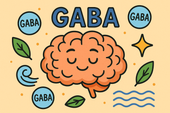
GABA Supplements for Reducing Anxiety and Mood Swings
Discover how GABA supplements can help reduce anxiety and balance mood naturally 🌿. Learn how this calming neurotransmitter works to quiet the mind, ease stress, and improve sleep — plus which nutrients and habits can boost your body’s own GABA production for long-term emotional stability.
-
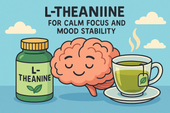
L-Theanine for Calm Focus and Mood Stability
Discover how L-theanine, the calming compound found in green tea 🍵, promotes focus, relaxation, and mood stability. Learn the science behind how it balances neurotransmitters, reduces stress hormones, and enhances clarity — helping you stay centered, calm, and productive without sedation.
-
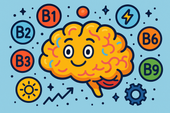
B Vitamins and Brain Chemistry: Supporting Energy and Emotional Balance
Discover how B vitamins power your brain chemistry ⚡. Learn how B6, B9, and B12 support serotonin, dopamine, and energy production — helping boost focus, mood, and emotional balance. From diet to supplements, explore how this vital nutrient group keeps your mind resilient and your energy steady.
-

N-Acetyl Cysteine (NAC) and Mood Disorders: What the Research Says
Learn how N-Acetyl Cysteine (NAC) supports brain health and mood balance 🧠. Discover how this antioxidant helps reduce oxidative stress, regulate glutamate, and improve emotional stability in depression, bipolar disorder, and anxiety — backed by cutting-edge psychiatric research.
-

Supplements for Bipolar Disorder: What May Support Stability
Discover the best supplements for bipolar disorder 🌿 that may support emotional stability and brain health. Learn how nutrients like omega-3s, magnesium, vitamin D, and NAC can help reduce inflammation, balance neurotransmitters, and complement traditional treatment safely.

















































